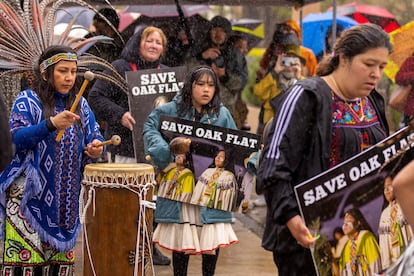Interior Department will give tribal nations $120 million to fight climate-related threats
Indigenous peoples in the U.S. are among the communities most affected by severe climate-related environmental threats, which have already negatively impacted water resources, ecosystems and traditional food sources

The Biden administration will be allocating more than $120 million to tribal governments to fight the impacts of climate change, the Department of the Interior announced Thursday. The funding is designed to help tribal nations adapt to climate threats, including relocating infrastructure.
Indigenous peoples in the U.S. are among the communities most affected by severe climate-related environmental threats, which have already negatively impacted water resources, ecosystems and traditional food sources in Native communities in every corner of the U.S.
“As these communities face the increasing threat of rising seas, coastal erosion, storm surges, raging wildfires and devastation from other extreme weather events, our focus must be on bolstering climate resilience, addressing this reality with the urgency it demands, and ensuring that tribal leaders have the resources to prepare and keep their people safe is a cornerstone of this administration,” Interior Secretary Deb Haaland, a member of the Pueblo of Laguna, said in a Wednesday press briefing.
Indigenous peoples represent 5% of the world’s population, but they safeguard 80% of the world’s biodiversity, according to Amnesty International. In the U.S., federal and state governments are relying more on the traditional ecological knowledge of Indigenous peoples to minimize the ravages of climate change, and Haaland said ensuring that trend continues is critical to protecting the environment.
“By providing these resources for tribes to plan and implement climate risk, implement climate resilience programs in their own communities, we can better meet the needs of each community and support them in incorporating Indigenous knowledge when addressing climate change,” she said.
The department has adopted a policy on implementing Indigenous knowledge, said Assistant Secretary of the Interior Bryan Newland, a citizen of the Bay Mills Indian Community. “We are also investing in tribes’ ability to use their knowledge to solve these problems and address these challenges close to home,” he said.
The funding will come from President Joe Biden’s Investing in America agenda, which draws from the Inflation Reduction Act, the Bipartisan Infrastructure Law, and annual appropriations.
The funding is the largest annual amount awarded through the Tribal Climate Resilience Annual Awards Program, which was established in 2011 to help tribes and tribal organizations respond to climate change. It will go toward the planning and implementation projects for climate adaptation, community-led relocation, ocean management, and habitat restoration.
The injection of federal funding is part of Biden’s commitment to working with tribal nations, said Tom Perez, a senior adviser to the president, and it underscores the administration’s recognition that in the past the U.S. has left too many communities behind. “We will not allow that to happen in the future,” he said.
In 2022, the administration committed $135 million to 11 tribal nations to relocate infrastructure facing climate threats like wildfires, coastal erosion and extreme weather. It could cost up to $5 billion over the next 50 years to address climate-related relocation needs in tribal communities, according to a 2020 Bureau of Indian Affairs study.
Sign up for our weekly newsletter to get more English-language news coverage from EL PAÍS USA Edition
Tu suscripción se está usando en otro dispositivo
¿Quieres añadir otro usuario a tu suscripción?
Si continúas leyendo en este dispositivo, no se podrá leer en el otro.
FlechaTu suscripción se está usando en otro dispositivo y solo puedes acceder a EL PAÍS desde un dispositivo a la vez.
Si quieres compartir tu cuenta, cambia tu suscripción a la modalidad Premium, así podrás añadir otro usuario. Cada uno accederá con su propia cuenta de email, lo que os permitirá personalizar vuestra experiencia en EL PAÍS.
¿Tienes una suscripción de empresa? Accede aquí para contratar más cuentas.
En el caso de no saber quién está usando tu cuenta, te recomendamos cambiar tu contraseña aquí.
Si decides continuar compartiendo tu cuenta, este mensaje se mostrará en tu dispositivo y en el de la otra persona que está usando tu cuenta de forma indefinida, afectando a tu experiencia de lectura. Puedes consultar aquí los términos y condiciones de la suscripción digital.








































